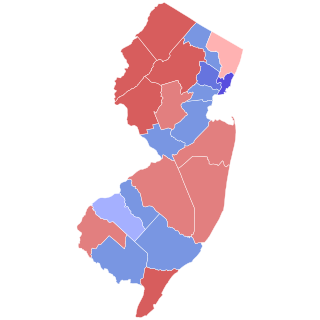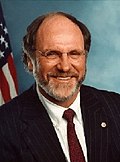Top Qs
Timeline
Chat
Perspective
2000 United States Senate election in New Jersey
From Wikipedia, the free encyclopedia
Remove ads
The 2000 United States Senate election in New Jersey was held on November 7, 2000. Incumbent Democratic U.S. Senator Frank Lautenberg retired rather than seeking a fourth term. Democratic nominee Jon Corzine, former CEO of Goldman Sachs, defeated the Republican U.S. Representative Bob Franks in a close election.
For most of the prior years, the election was expected to pit the incumbent, Lautenberg, against popular Republican governor Christine Todd Whitman. Lautenberg unexpectedly announced his retirement from the Senate in February 1999, leaving the race open. Whitman announced in April that she would form a campaign committee to enter the race in earnest; however, she stunned political observers in September 1999 by announcing that she would withdraw from the race, citing fundraising concerns.
Primary elections were held on June 7. Corzine defeated former Governor Jim Florio in the Democratic primary by a wide margin after a hard-fought campaign in which Corzine spent over $35 million of his own money. Franks narrowly defeated State Senator William Gormley to capture the Republican nomination.
In the general election, Corzine continued to spend freely to advertise his campaign and establish political support. Ultimately, he defeated Franks by approximately three percent of the total vote.
Remove ads
Background
Summarize
Perspective
Incumbent U.S. senator Frank R. Lautenberg was elected in 1982 in an upset victory over Representative Millicent Fenwick. In his two re-election bids, Lautenberg beat Pete Dawkins in 1988 by a 54%-46% margin and held back a challenge from Assembly Speaker Chuck Haytaian by a smaller margin of 50%-47% in 1994. New Jersey had not elected a Republican to the United States Senate since 1972.
For most of 1998 and 1999, speculation on the race centered on popular Republican governor Christine Todd Whitman, who had run a surprisingly strong campaign for the state's other Senate seat in 1990 and was widely expected to challenge Lautenberg for re-election. After a February 1999 poll by the Quinnipiac University Polling Institute indicated that Whitman would defeat Lautenberg by a wide margin, as would former Republican governor Tom Kean, Lautenberg unexpectedly announced that he would retire rather than seek a fourth term in office, leaving the seat open.[1][2] In her initial response to the announcment, Whitman told reporters that she was "seriously considering all of [her] options."[1]
Hypothetical polling with Frank Lautenberg
Lautenberg later regretted his decision not to run[citation needed] and was elected to New Jersey's other Senate seat in 2002 after his former colleague, Senator Robert Torricelli, prematurely ended his re-election campaign in disgrace.
Whitman filed a campaign committee with the Federal Election Commission on April 8, 1999 in order to raise funds for a potential race. In her announcement, Whitman said, "This is not an exploratory committee. This is a campaign committee. I am obviously very serious about contemplating this run and moving forward." She emphasized that she would focus on "being governor" and refrain from campaign until 2000.[6] Her campaign committee was chaired by prominent fundraisers Lewis Eisenberg and Candace Straight, and Whitman was also expected to rely on her large family fortune to fund her campaign.[6]
Despite her large lead in all public opinion polling, Whitman stunned observers herself by announcing on September 8, 1999 that she no longer planned to run for the vacant seat. At a public news conference at the New Jersey State House, she said that she had made the decision while on a recent family vacation after determining that the race would be "a distraction from finishing the work New Jersey voters had asked me to complete."[7] She also cited her concerns regarding "the amount of money that needs to be raised and just the time that it takes to do it."[7] Privately, Whitman had reportedly factored in the burden of outspending Jon Corzine, who had promised to spend any amount necessary to win the race and had a personal fortune estimated at over $300 million and had already given his campaign $500,000 in direct funding.[7] Whitman advisers were reportedly surprised by the decision, since she had raised approximately $2.3 million since her committee was announced. She explicitly denied rumors that she had withdrawn due to health concerns or in order to be nominated for vice president of the United States as a running mate to George W. Bush. Bush publicly expressed his surprised and regret at her withdrawal.[7]
The Whitman announcement immediately reversed the outlook for the two major political parties. Republicans admitted that the decision left them without a clear front-runner for the nomination, while the two Democratic candidates, Corzine and Jim Florio, predicted that the Democratic primary would determine the election.[7] Paul von Zielbauer of The New York Times noted that despite her wide lead in all polling, Whitman had won her two campaigns for governor by narrow margins and had never been on the ballot in a presidential election year, when Democratic voters typically turned out in larger numbers, and growing scrutiny of the use of racial profiling by the New Jersey State Police may have contributed to her decision not to run.[7]
Hypothetical polling with Christine Whitman
Remove ads
Democratic primary
Summarize
Perspective
Candidates
- Jon Corzine, former CFO and senior partner of Goldman Sachs
- James Florio, former Governor of New Jersey and U.S. representative[1]
Withdrew
- Frank Lautenberg, incumbent U.S. senator since 1982
Declined
- B. Thomas Byrne, former chair of the New Jersey Democratic Committee and son of governor Brendan Byrne[1]
- Hillary Rodham Clinton, First Lady of the United States (ran for U.S. Senate in New York)[2]
- Neil M. Cohen, assemblyman from Roselle[1]
- Susan Bass Levin, mayor of Cherry Hill (ran for U.S. House)[1]
- Bob Menendez, U.S. representative from Union City (ran for re-election)[1][2]
- Bob Smith, assemblyman from Piscataway and candidate for U.S. House in 1992[1]
- Frank Pallone, U.S. representative from Long Branch (ran for re-election)[1]
- Steve Rothman, U.S. representative from Fair Lawn (ran for re-election)[1]
Campaign
Following Lautenberg's announced retirement, several candidates publicly considered campaigns. The leading contender was U.S. representative Bob Menendez, who had considered campaigns for Senate in 1996 and governor in 1997 before ultimately declining to run. Menendez had recently been elected to House leadership and had raised $1.5 million in anticipation of Lautenberg's retirement, though he had stopped his fundraising efforts in 1998 in an effort to preserve party unity.[1][2] However, Menendez did not enter the race.
The field ultimately narrowed to Jim Florio, the former governor who had been defeated by Whitman in 1993, and Jon Corzine, a former Goldman Sachs executive who spent freely to secure the nomination. Privately, party leaders questioned the desirability of running Florio, since they preferred to support a new face for the nomination.[1]
Corzine spent $35 million of his fortunes into this primary election alone.[10][11]
During the campaign, Corzine made a number of controversial off-color statements. Emanuel Alfano, chairman of the Italian-American One Voice Committee, claimed that when introduced to a man with an Italian name who said he was in the construction business, Corzine quipped, "Oh, you make cement shoes!" Alfano also reported that when introduced to a lawyer named David Stein, Corzine said, "He's not Italian, is he? Oh, I guess he's your Jewish lawyer who is here to get the rest of you out of jail."[12] Corzine denied mentioning religion, but did not deny the quip about Italians, claiming that some of his own ancestors were probably Italian or maybe French.[13][14]
Polling
Endorsements
Corzine was endorsed by State Senators Raymond Zane, Wayne Bryant, and John Adler. He was also endorsed by U.S. Representative Bob Menendez and U.S. Senator Robert Torricelli.
Florio was endorsed by the New Jersey Democratic Party, Assemblyman Joseph Doria and State Senator John A. Lynch Jr.
Results
Remove ads
Republican primary
Candidates
- William Gormley, state senator from Mays Landing[1][7][20]
- Bob Franks, U.S. representative from Summit[7]
- Murray Sabrin, Ramapo College professor and Libertarian Party nominee for governor in 1997[1]
- James Treffinger, Essex County Executive and former mayor of Verona[1][7]
Withdrew
- Brian T. Kennedy, former state senator from Sea Girt and perennial candidate[20][21]
- Christine Todd Whitman, governor of New Jersey since 1994 (formed campaign committee April 8, 1999; withdrew September 7, 1999)[1][7]
Declined
- Jack Collins, speaker of the New Jersey General Assembly[7]
- Lewis Eisenberg, chair of the Port Authority of New York and New Jersey and chair of the Whitman campaign[7]
- Steve Forbes, publisher of Forbes and candidate for president in 1996 (ran for president)
- Thomas Kean, former governor of New Jersey
- Frank LoBiondo, U.S. representative from Vineland (ran for re-election)[1][7]
- Marge Roukema, U.S. representative from Ridgewood (ran for re-election)[1]
- Dick Zimmer, former U.S. representative from Delaware Township and nominee for U.S. Senate in 1996[1][7]
Polling
Hypothetical polling
Results
Remove ads
General election
Summarize
Perspective
Candidates
- Bruce Afran (Green)
- Dennis A. Breen (Independent)
- J.M. Carter (Trust In God)
- Jon Corzine, former CFO of Goldman Sachs (Democratic)
- Pat DiNizio, lead singer of The Smithereens (Reform)
- Emerson Ellett (Libertarian)
- Bob Franks, U.S. Representative from Summit (Republican)
- George Gostigian (God Bless NJ)
- Lorraine LaNeve (Conservative)
- Gregory Pason (Socialist)
- Nancy Rosenstock (Socialist Workers)
Declined
Campaign
Franks, a moderate Republican,[25] attacked Corzine for "trying to buy the election and of advocating big-government spending programs that the nation can ill afford." Corzine accused Franks of wanting to "dismantle" the Social Security system because he supported Governor George W. Bush's partial privatization plan.[26]
During the campaign, Corzine refused to release his income tax return records. He claimed an interest in doing so, but he cited a confidentiality agreement with Goldman Sachs. Skeptics argued that he should have followed the example of his predecessor Robert Rubin, who converted his equity stake into debt upon leaving Goldman.[27]
Corzine campaigned for state government programs including universal health care, universal gun registration, mandatory public preschool, and more taxpayer funding for college education.[28][29] He pushed affirmative action and same-sex marriage.[30] David Brooks considered Corzine so liberal that although his predecessor was also a Democrat, his election helped shift the Senate to the left.[31]
Corzine was accused of exchanging donations to black ministers for their endorsements after a foundation controlled by him and his wife donated $25,000 to an influential black church.[32] Rev. Reginald T. Jackson, the director of the Black Ministers Council, and a notable advocate against racial profiling against minority drivers in traffic stops, was criticized for endorsing Corzine after receiving a large donation from the then candidate.[33]
Franks generally trailed Corzine in the polls until the final week, when he pulled even in a few polls. Corzine spent $63 million, while Franks spent only $6 million.[34]
Debates
- Complete video of debate, October 7, 2000
- Complete video of debate, October 8, 2000
- Complete video of debate, October 13, 2000
- Complete video of debate, October 20, 2000
Polling
This graph was using the legacy Graph extension, which is no longer supported. It needs to be converted to the new Chart extension. |
Hypothetical polling
Results
Despite being heavily outspent, Franks lost by only three percentage points, doing better that year than Republican Governor George W. Bush in the presidential election, who obtained just 40.29% of the vote in the state.[42]
Counties that flipped from Democratic to Republican
- Bergen (largest municipality: Hackensack)
- Burlington (largest municipality: Evesham Township)
Remove ads
See also
Notes
References
External links
Wikiwand - on
Seamless Wikipedia browsing. On steroids.
Remove ads




